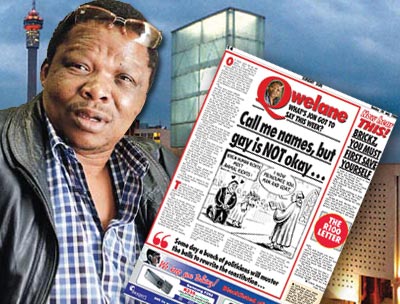SA PSYCHOLOGISTS VS JON QWELANE

Jon Qwelane and his notorious article
The Psychological Society of South Africa (PsySSA) is set to provide evidence against Jon Qwelane in the long running hate speech case against the homophobic former journalist.
Qwelane is hoping to overturn his 2011 hate speech conviction for his notoriously homophobic 2008 article “Call me names, but gay is NOT okay…”
He is specifically challenging section 10(1) of the Equality Act under which he was convicted, on the basis that it infringes on his constitutional right to free speech.
On Tuesday, PsySSA announced that it had filed papers as amicus curiae (‘friend of the court’) in the South Gauteng High Court in which the South African Human Rights Commission will defend its case against Qwelane.
PsySSA said that it will present evidence and make submissions regarding the important purpose served by section 10(1) of the Equality Act “to stem systemic verbal and physical violence based on the prohibited grounds of discrimination in that Act”.
Represented by Webber Wentzel attorneys on a pro bono basis, PsySSA intends to show that the Equality Act does not criminalise hate speech.
“Rather it balances the right to freedom of expression against the constitutional protection of equality and dignity of all persons, regardless of their status or identity,” said the group.
It argues that section 10(1) of the act is constitutional in that, “although it limits the right to freedom of expression under section 16 of the Constitution, it does so in a manner that is reasonable and justifiable and satisfies the requirements of section 36 of the Constitution”.
PsySSA also stated that “The Act is concerned with remedying the pernicious effects of discrimination on the victims of that discrimination and society generally. It does so by providing for a range of innovative and flexible civil remedies”.
PsySSA will also present research-based evidence of the harmful psychological effects and consequences of hate speech on members of the lesbian, gay, bisexual, transgender and intersex community and on broader society.
“It is critical that in making its determination, the court considers the nature and extent of the material harm caused by homophobic hate speech,” commented Professor Juan Nel, Department of Psychology, University of South Africa and President Elect of PsySSA.
“This wider social context is critical to understanding the tangible consequences of such hate speech on the lives of those who are its target and society at large.”
Dr. Saths Cooper, President of the International Union of Psychological Science, adds that, “through its submissions to the court PsySSA will show how an understanding of the psychological effects of the underlying prejudices in our society and their expression is necessary for the development of a healthy post-apartheid South Africa”.
In the 2008 article, Qwelane equated homosexuality with bestiality, praised Robert Mugabe’s oppression of gays and lesbians and encouraged the removal of the sexual orientation protection clause from the Constitution.
While an Equality Court ruled that the article “propagates hatred and harm against homosexuals” and ordered Qwelane to apologise to the gay community and to pay damages of R100,000 towards an LGBT rights group, he has continued to challenge the ruling.
Despite his outrageous statements that flagrantly flouted the country’s ethos of Constitutional equality he was made South Africa’s high commissioner in Uganda.
The case has been provisionally set down to be heard on 10 March 2014 in the South Gauteng High Court. There are indications that Qwelane intends to fight the matter all the way to the Constitutional Court.
This imbecile needs to be ignored completely !